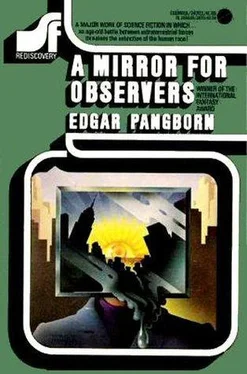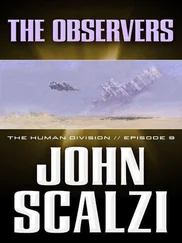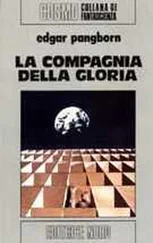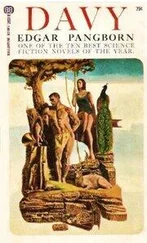“I think so,” said Abraham, with the same dangerous quiet that had been in him all day. “So now, in order to hide the truth and escape the consequences, they’ve killed the one man who knew most about it, who must have already done a lot of work toward finding an immunization or a cure. Killed his family too, but they wouldn’t consider that — another product of the doctrine that the end justifies the means. I met the little boy once. He was a bright kid….”
“Promise me something, Abraham?”
“If I can.”
“Don’t start anything unless I’m with you.”
He came and stood over my chair, smiling down with more straightforward unconsidered affection than he had ever shown me. “I can’t promise that, Will.”
Presently I said: “I know you can’t.” Nor could I have made the same promise to him, so I had to tell myself that it was fair enough. I have learned a little since that night in the cemetery when Namir escaped me. Namir will not escape again, and I think Keller will have to die with him: Keller is a well-trained son of his father, and I don’t think the Old City hospital could do anything with him. The only problem now is to isolate them from human contact long enough to do what I must. And I must do it before this flame in Abraham explodes into some action he may not have the strength to carry through.
That evening paper added nothing to our knowledge of the spread of the disease. More demoralized than the Times. No statistics. The radio has been silent about it all evening. Abraham is sleeping, I think. Fortunately I do not need to.
New York Friday, March 17
From this morning’s paper: New York area, 436 reported cases, 170 deaths.
I think they were right to hold the St. Patrick’s Day parade. It would have been against the public interest to cancel such an expected and time-honored thing, in spite of the clear danger that large gatherings might help to spread the contagion. We didn’t go to see it. Abraham has been in a faraway abstraction all day, his mind talking to his mind, demanding answers. The evening paper says the crowds were small, and there was “some disturbance” when one of the paraders fell from his horse in a “sudden heart attack.” A heart attack?
There was also a broadcast statement from the White House at six o’clock, urging the nation to keep calm. Panic, said President Clifford, was more dangerous than epidemic. The country’s medical resources are adequate to deal with the — emergency. He had some slight trouble with that word, his voice not quite in control, his deep-lined, still handsome face tightening itself to force out the syllables smoothly. His television make-up wasn’t too good. I think they had tried to soften the furrows in his forehead, but they couldn’t make him anything except a frightened, essentially brave and decent little man carrying a burden too heavy for anyone. Civil Defense organizations, he said, have been placed under the direction of the Surgeon General of the Army — who followed Clifford on the video with a fair display of jaw and stop-this-nonsense eyebrows. Avoid crowds, said Surgeon General Craig, stay home from everything but essential work, obey all, repeat all, orders of local medical authorities and Civil Defense personnel. All theaters, stadia, bars, other public meeting places will be closed for the duration of the emergency. Use your radio to keep in touch with the efforts of your government. The pandemic — Craig stopped there for a second, shaking his big head as if at a buzzing fly; he had meant to say “epidemic” but the other slipped out. The pandemic, Craig said, is caused by a new virus, possibly a mutation from the virus of poliomyelitis. Promising efforts are under way to isolate it and to develop a serum. This will take time. Repeat, avoid crowds, stay home except—
From a ten o’clock broadcast: the disease is reported from Oslo, Paris, London, Berlin, Rome, Cairo, Buenos Aires, Honolulu, Kyoto.
Friday midnight
I have got up from a sleepless bed to write down something Abraham said before he went to his room. I force myself to admit that the disease could strike him too; that he could die tomorrow; my need to write what he said derives from that admission.
After I turned off the radio we talked a little of what men call the Second World War, meaning that phase of the twentieth-century war which came to a partial end in 30,945, six years before Abraham was born. In giving him some (humanly censored) memories, I referred to the “expendable millions.”
Abraham said: “No one is expendable.”
New York Saturday, March 18
From the Times: in the nation at large, 14,623 reported cases, 3561 deaths, as of Friday, 8 p.m. More than twenty-five per cent mortality: the proportion is rising. Those patients whose fevers level off above normal merely take longer in dying. But several of those stricken earliest are showing “probable” signs of recovery — temperature normal or nearly so, consciousness recovered although usually with sense impairment and varying degrees of localized paralysis apparently due to damaged or destroyed neural tissue. They are calling it paralytic polyneuritis. The headlines have already shortened that to para.
Abraham went over to Brooklyn early this morning to see Sharon. I went to the Green Tower Colony.
Para….
The streets are not as they were Thursday afternoon. Human beings still pass you, in groups of two or three, not more. They glance at you quickly, and away quickly, huddling together, clinging to the selves and the faces they know, afraid of strangers. You hear their voices, not always like individual voices. The city is whispering para. Over and over, the one word, a faraway drumbeat, or a giant muttering in tormented sleep. Para. One word, which means…
A man staggers on the sidewalk, reaches out for the wall of a building to steady himself with one hand; the other hand joins it, as if he wanted to embrace what was never there. Both hands begin to dance at the finger ends. No one hurries to help him as his knees give way and his forehead touches the wall. The couple who had been walking behind him swerve and run scramblingly across the street, the woman pressing a handkerchief over her mouth, the man glaring back as he runs with a meaningless square-mouthed smile. They would like to help, but…
Para means a little dog trotting down the center of Third Avenue dragging a leash. Traffic has thinned to nearly nothing. The golden spaniel isn’t quite right in the legs: a hind leg gives way now and then, but he hurries on, hunting for something — help, I suppose. The small head jerks repeatedly to the left; he tries to bark, with only a strangled wheeze. Then both hind legs fail him, and he struggles to keep moving, pulling with his forepaws, a dog’s patient determination in unaccusing eyes. A car approaches slowly, turns out to avoid him. A woman screams at the driver, pointing: “He’s got it! Finish him!” Obediently the car backs and shoots forward, then crazily off uptown as if the mechanism itself had sickened at a thing which at the moment seemed necessary. The woman snatches up a wire waste receptacle and hurls it at the little smear of blood and golden hair. Ordinarily she could hardly have lifted it. She takes out her lipstick, carefully paints a new mouth, fumbles at a place where the wire snagged her dress, but walks away without looking for the compact that fell from her fingers and rolled into the street.
Para means a man throwing open a front door to stare up and down the street. He is crying, and shouts (not to me or anyone else): “Those bastards won’t ever get here!”
Para means a mob looting a liquor store. I saw that on Third Avenue from the corner of Twenty-third Street. There were a dozen or so, including a few women. The store must have been locked, for there were plate-glass fragments on the pavement. The looters seemed comically serious about it, until a woman broke away from them and plunged toward me, clasping three bottles like a baby to her breasts. She called back: “You can’t live forever!” And squalled with laughter when two men started after her. I don’t know what happened when they caught her; I turned into Twenty-third Street to get out of the way. By evening they will be shooting down looters, most likely. Vigilantes will organize to do it if the police can’t.
Читать дальше












